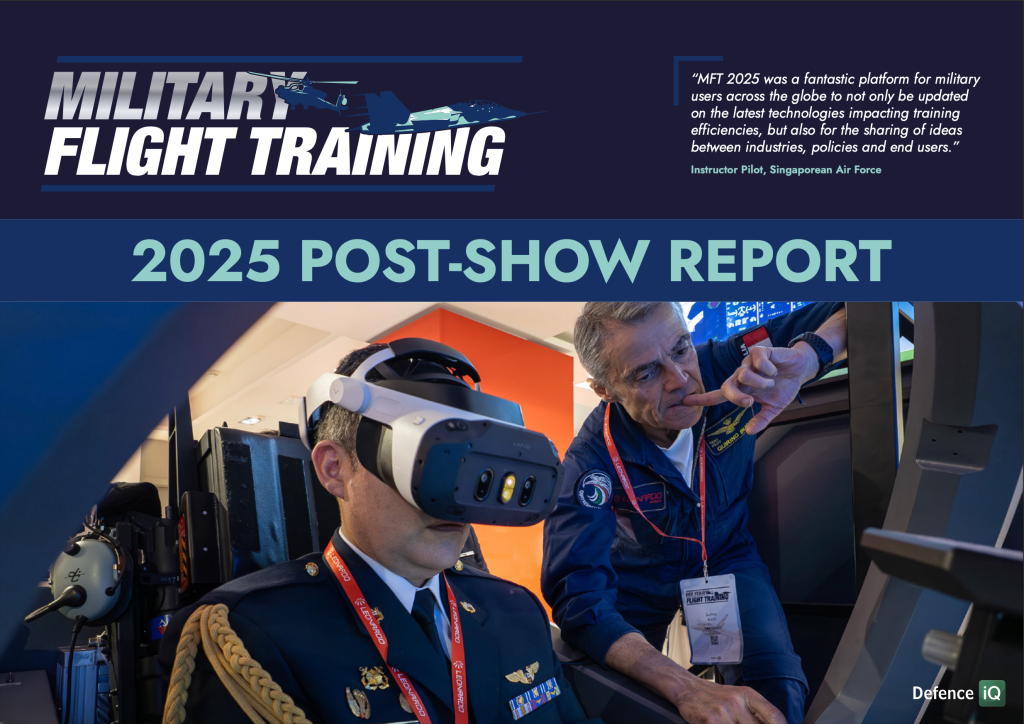
Military Flight Training 2025 Agenda
The Military Flight Training conference has become established as the premier meeting ground for the NATO alliance and partner states, attracting over 300+ senior leaders, from 40 Nations, including Air Force Commanders, Chiefs of Air Staff, Army and Navy Aviation Commanders, Heads of Flight Training, Directors of Materiel, heads of Strategic Programs, Capability Planners, as well as leading solution providers.
Held from 31 March to 02 April 2025, in partnership with the Italian Air Force and officially supported by NFTE, MFT 2025 addressed training challenges and opportunities for the full range of aircrews — from fixed-wing to rotary-wing, fast jet and multi-engine aircraft, including 5th and 6th generation fighter aircraft — to ensure that, as an Alliance, we remained one step ahead in contested environments.
This conference arrived at a time when guaranteeing air superiority and strike capability had never been more challenging.
![[Exclusive Presentation] Successfully Leveraging and Expanding the use of critical Technologies for Military Flight Training - Italian Air Force [Exclusive Presentation] Successfully Leveraging and Expanding the use of critical Technologies for Military Flight Training - Italian Air Force](https://eco-cdn.iqpc.com/eco/images/event_content/uMWFQOW9P56bTJztbUN9mDvTZydFcjFwHibXFsbs.png)
[Exclusive Presentation] Successfully Leveraging and Expanding the use of critical Technologies for Military Flight Training - Italian Air Force
Download the official presentation delivered by Brigadier General Edi Turco at the 2024 Military Flight Training Conference.
Discover how the Italian Air Force is leading the way with cutting-edge training technologies:
- Live Virtual Constructive (LVC) Systems
- Embedded Tactical Training System (ETTS)
- Simulator-Based Training (CBT/SBT)
- Full Mission Simulators and the T-346
- Integrated Training System (ITS)
Why Download?
This exclusive presentation gives you a sneak peek into the high-caliber content you can expect at the 2025 Military Flight Training Conference, where 300+ leaders from over 40 nations will address the training challenges for aircrews across fixed wing, rotary wing, and 5th/6th generation fighter aircraft.

Update on NATO Flight Training Europe Interview with Jason Hawker
NATO's air forces cannot afford not to have the necessary aircrew trained to the latest standard. Geopolitical tensions worldwide require air forces to be ready to fly the newest generation platforms, which operate in entirely new ways compared to previous generations. While the cost of training such a force is high, not having a force trained to the state-of-the-art standard may prove catastrophic. Looking towards its members, the alliance launched NATO Flight Training Europe, a high visibility aimed at increasing cooperation and rationalising resources across borders to ensure state-of-the-art training is delivered cost-effectively. Its activities are not only limited to member states but industry as well. Learn more about this crucial programme with our interview with NSPA’s Principal Officer and MFT 2025 conference speaker, Jason Hawker, where he covers:
- The latest updates on the NFTE.
- Insight into the impact of the newly created NATO Industrial Advisory Group NIAG.
- An understanding of what the future holds for the programme.

Military Flight Training 2025 Attendee List
View the attendee snapshot to find out which companies of senior military practitioners and industry leaders within the military aviation community have confirmed their attendance.

Military Flight Training Post Show Report 2025
The Military Flight Training 2025 Post-Show Report offers an overview of the 2025 event, which took place in Sardinia, Italy. It captures key insights from senior military leaders, industry experts, and training specialists, covering emerging technologies, pilot development, and multinational cooperation. The report is a valuable resource for military decision-makers, defence industry partners, and training professionals looking to benchmark practices, identify future requirements, and inform strategic planning. The MFT Post Show Report also serves as a reference point for ongoing collaboration and preparation for MFT 2026.
Key Topics Covered:
-Preparing pilots for 5th and 6th generation air combat
-Human-machine teaming and AI integration in training
-Live Virtual Constructive (LVC) technologies and simulation
-Multinational collaboration to address pilot demand and capacity gaps
-Evolving the human performance and mental resilience of aircrews

Vision and Way Ahead: ITAF Training for 5th and 6th Gen Pilot; Lieutenant General Silvano Frigerio
The Italian Air Force has undergone some of its most essential transformations in decades. The advent of new data processing-related technologies, such as Machine Learning and Artificial Intelligence, as well as the rising complexity of the near-peer threat, means that ITAF's Military Flight Training needs to adapt to ensure it remains a tier 1 Air Force. We had the privilege to interview ITAF AETC Commander Lt. General Silano Frigerio, who touched on a number of themes, including:
- The vision, trends, and threats ahead
- Important nuances related to military flight training
- Key skills and abilities new pilots need to develop

Fighting Falcons Over Ukraine; UAF F-16 Military Flight Training
The adoption of the F-16 by the Ukrainian Air Force has received much fanfare in the media, as many still see it as the premier fighter for several air forces worldwide. In the eyes of many, this conflict allows the F-16 to do what it was designed to do: deliver air superiority against Russian fighters. Unfortunately, integrating the F-16 is easier said than done, as it requires a shift in logistical needs, a rethink of Ukrainian Air Force doctrine, and, most importantly, extensive training. Former Deputy Head of the Kharkiv Air Force University shares his thoughts.

PAST PRESENTATION: Requirement of Modern Flying Training Systems by Colonel Bernard Hey, German Air Force
This presentation covers the Training System Requirements of the Bundeswehr as they adopt “Advanced Embedded Tactical Training”

PAST PRESENTATION: Getting Ready and Resilient by Air Commodore David Strong, Australian Air Force
Air Commodore Strong covers the Royal Australian Air Force Strategy in delivering a resilient training programme

PAST PRESENTATION: Competence Based Training in Basic and Advanced Pilot Training in the Finnish Air Force by Lieutenant Colonel Kari Rusanen, Finnish Air Force
The presentation delivers the current efforts of the Finnish Air Force in preparing for a 5th gen age.

PAST PRESENTATION: Adapting SwAF training to New Conditions by Major Michael Rosenqvist, Swedish Air Force
Major Rosenqvist covers where the SwAF is now and where it wants to be

Interview with Group Captain Mike Jordan, Commandant, Central Flying School
Group Captain Mike Jordan has recently been promoted to commandant of the Central Flying School (CFS) in the UK. Responsible for training instructors, he gives an exclusive interview to Defence iQ where he gives insight into:
- The current state-of-play in military flight training
- The challenges and opportunities faced by the CFS
- The implications of the rise of synthetic training
- What he will bring to the school

Interview with Group Captain Higgins
Defence iQ had the privilege to interview Gp Capt. Higgins from the Central Flying School (CFS) based at RAF Cranwell. He is part of an RAF unit, which assures the quality and excellence of aircrew instruction. The interview gives insight into the “modus operandi” of one of the top tier aircrew training organisations in Europe.
Fill out the form to download now>>

Tackling The Pilot Shortage the SWAF Way
Pilot retention remains one of the main challenges for modern air forces. Major Rosenqivist, MFT Project Manager of the Swedish Airforce, shares his views on how the SWAF has addressed this challenge. Through a combination of the “Swedish Mindset”, new training tools and partnerships, Sweden has, in many ways, become a benchmark in pilot retention. Major Rosenqivist reflects on Sweden's progress while briefly reflecting on the implications of Sweden joining NATO.
This Article:
• Covers Sweden's relative success in pilot retention
• Discusses Swedish cultural impact on pilot training
• Poses the question of where Swedish Pilot training goes from here within NATO



